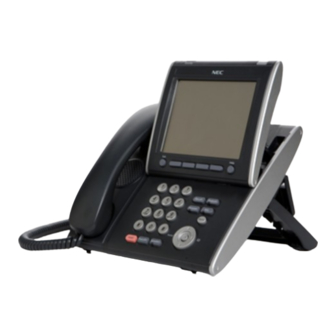
NEC DT750 Quick Reference Card
Hide thumbs
Also See for DT750:
- User manual (228 pages) ,
- Quick reference card (2 pages) ,
- User manual (142 pages)
Advertisement
Quick Links
DT750
Quick Reference Card
for DT750 phones controlled by the
SV8100
Communication Server
Some of the features described in this
Quick Reference Card might require
additional programming in the
Communication Server. For detailed
information please consult the
comprehensive User Guide available at:
www.nec‐unified.com.
© NEC Unified Solutions 2010
All rights are reserved. Reproduction in whole or in part is prohibited
without the written consent of the copyright owner.
All brand names and product names in this document are trademarks
or registered trademarks of their respective companies.
Issue : 1.0 ‐ May 2010
1. Security Button ‐ Allows the user to block the
terminal, preventing information leaks.
2. Call Indicator Lamp ‐ This lamp flashes when a
call terminates to the terminal and lights steadily
when a message is available.
3. LCD – Color touch panel LCD. The screen consists
of the following three information areas:
(a) Icon Area ‐ In this area you will see notifications
when events occur (such as missed calls)
DT750 Quick Reference Card for SV8100
(a) Icon Area
(b) DESI Less Information Area
(c) Time/Feature Activity
Information Area
(b) DESI Less Information Area – Provides
information of the 32 Programmable Keys.
(c) Time/Feature Activity Information Area – Time
Display and information on various feature
activities. Also Soft Keys information.
4. Exit ‐ This key allows you to exit from the Menu
or Help mode and go back to the main screen.
5. Soft Keys The Soft Keys show the available
features for your current activity. Any feature
shown at the bottom of the LCD is available.
6. Help ‐ Press this key to display information about
the Soft Keys that are in the current LCD display.
7. Recall ‐ Press key to finish the call and hear the
dial tone.
8. Feature ‐ Used to activate any features and to
program One‐Touch Speed Dial Keys.
9. Answer ‐ When the LED is ON, press the key to
answer a waiting call.
10. Mic ‐ Press this key to mute the microphone: the
LED is OFF. Press the key again to un‐mute the
microphone. Be aware that this key is only for
the hands‐free microphone and does not have
any effect on the headset.
11. Menu ‐ Press this key to access the functions
which are used now and then (such as terminal
settings).
12. Cursor Key ‐ Use this key to access various
features with simple operation.
‐ Scroll UP key ‐ Enter key
‐ Volume (UP) key ‐ Shortcut key
‐ LEFT key ‐ RIGHT key
‐ Redial Key ‐ Directory key
‐ Scroll DOWN key
‐ Volume (DOWN) key
13. Speaker ‐ Controls the built‐in speaker which can
be used for Hands Free dialing/monitoring.
14. Transfer ‐ Allows the station user to transfer
established calls to another station.
15. Hold ‐ Places current call on hold. To resume the
held call, press the Line Key. During a held call,
you can dial another party by selecting a New
Flexible Line Key which provides dial tone.
1
Advertisement

Summary of Contents for NEC DT750
- Page 1 4. Exit ‐ This key allows you to exit from the Menu or Help mode and go back to the main screen. 5. Soft Keys The Soft Keys show the available features for your current activity. Any feature shown at the bottom of the LCD is available. 6. Help ‐ Press this key to display information about the Soft Keys that are in the current LCD display. 7. Recall ‐ Press key to finish the call and hear the dial tone. 8. Feature ‐ Used to activate any features and to program One‐Touch Speed Dial Keys. 9. Answer ‐ When the LED is ON, press the key to DT750 answer a waiting call. Quick Reference Card 10. Mic ‐ Press this key to mute the microphone: the LED is OFF. Press the key again to un‐mute the 1. Security Button ‐ Allows the user to block the microphone. Be aware that this key is only for for DT750 phones controlled by the terminal, preventing information leaks. the hands‐free microphone and does not have 2. Call Indicator Lamp ‐ This lamp flashes when a any effect on the headset. ...
- Page 2 8470 Do Not Disturb cancel 4. Press the Down Arrow Soft Key to jump to that 841 Message Waiting Lamp Control set section. 871 Message Waiting Lamp Control Cancel 5. Press Up or Down Arrow Soft Key to scroll CONFERENCE CALLS through the list. 1. While on a call, press the CONF soft key. 6. Press SPEAKER key or lift handset to place call or 2. Dial desired number. press DIAL soft key 3. After call is answered, press the ADD Soft key 4. To begin conference, press the BEGIN soft key 5. Three‐way conference is established. Issue : 1.0 ‐ May 2010 DT750 Quick Reference Card for SV8100 2 ...












